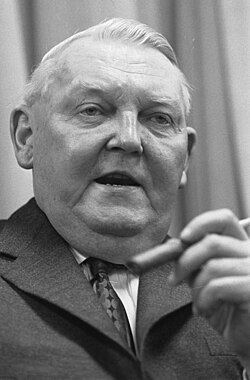| Portfolio | Minister | Took office | Left office | Party |
|---|
| Chancellor | | 26 October 1965 | 30 November 1966 | | Independent |
| Vice-Chancellor | | 26 October 1965 | 28 October 1966 | | FDP |
| 28 October 1966 | 30 November 1966 | | CDU |
| Federal Minister of Transport | Hans-Christoph Seebohm | 26 October 1965 | 30 November 1966 | | CDU |
| Federal Minister of Foreign Affairs | | 26 October 1965 | 30 November 1966 | | CDU |
| Federal Minister of Internal Affairs | | 26 October 1965 | 30 November 1966 | | CDU |
| Federal Minister of Justice | | 26 October 1965 | 30 November 1966 | | CSU |
| Federal Minister of Finance | | 26 October 1965 | 28 October 1966 | | FDP |
| 28 October 1966 | 30 November 1966 | | CDU |
| Federal Minister of Economics | Kurt Schmücker | 26 October 1965 | 30 November 1966 | | CDU |
| Federal Minister of Food, Agriculture and Forests | | 26 October 1965 | 30 November 1966 | | CSU |
| Federal Minister of Labour and Social Affairs | | 26 October 1965 | 30 November 1966 | | CDU |
| Federal Minister of Defence | | 26 October 1965 | 30 November 1966 | | CDU |
| Federal Minister of Post and Communication | | 26 October 1965 | 30 November 1966 | | CSU |
| Federal Minister of Building and Urban Development | | 26 October 1965 | 28 October 1966 | | FDP |
| 28 October 1966 | 30 November 1966 | | CDU |
| Federal Minister of Family and Youth Affairs | Bruno Heck | 26 October 1965 | 30 November 1966 | | CDU |
| Federal Minister of All-German Affairs | Erich Mende | 26 October 1965 | 28 October 1966 | | FDP |
| 28 October 1966 | 30 November 1966 | | CDU |
| Federal Minister of Displaced Persons, Refugees and War Victims | Johann Baptist Gradl | 26 October 1965 | 30 November 1966 | | CDU |
| Federal Minister of Scientific Research | | 26 October 1965 | 30 November 1966 | | CDU |
| Federal Minister of Economic Cooperation | | 26 October 1965 | 28 October 1966 | | FDP |
| 28 October 1966 | 30 November 1966 | | CSU |
| Federal Minister of Treasury | Werner Dollinger | 26 October 1965 | 30 November 1966 | | CSU |
| Federal Minister of Health Affairs | | 26 October 1965 | 30 November 1966 | | CDU |
| Federal Minister of the Affairs of the Federal Defence Council | | 26 October 1965 | 30 November 1966 | | CDU |
| Federal Minister of the Affairs of the Federal Council and the States | Alois Niederalt | 17 October 1963 | 26 October 1965 | | CSU |
Federal Minister of Special Affairs &
Head of the Chancellery | Ludger Westrick | 26 October 1965 | 30 November 1966 | | CDU |
